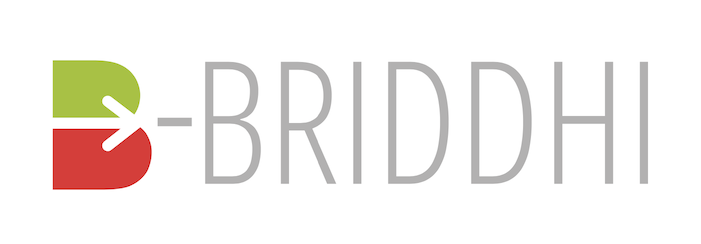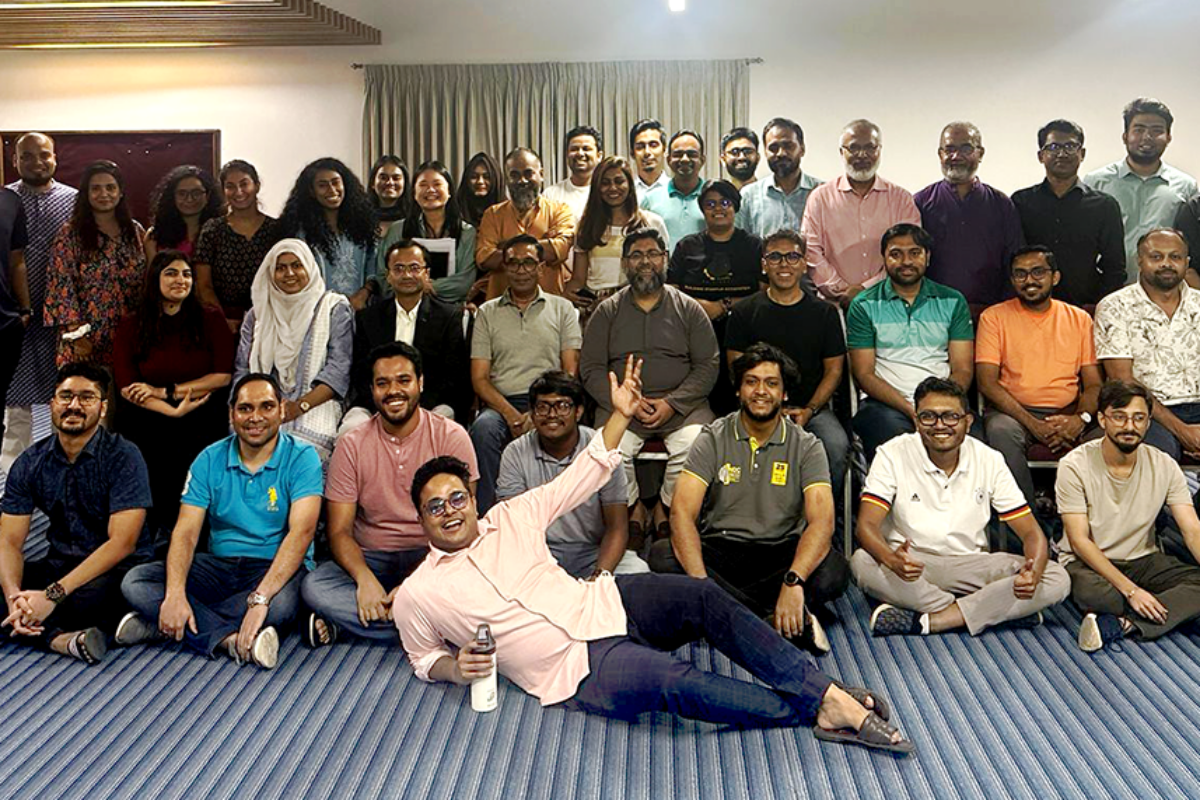We made a two-week collaborative journey into Bangladesh’s vibrant impact entrepreneurship ecosystem – and shared some exciting news.
Over 14 days, the programme implementation team of B-Briddhi had the opportunity to delve deep into the heart of Bangladesh’s vibrant entrepreneurial ecosystem. We uncovered the stories of those driving positive change and shaping a brighter future for their communities. We discussed the concept of adaptive leadership and fostered existing and new partnerships. We orchestrated workshops, meetings and conferences in both Dhaka and Khulna. And we spread the news that B-Briddhi will be extended by a second phase of another 4 years. We couldn’t be more excited that we will be able to continue our mission and help create a more impactful and sustainable impact entrepreneurship ecosystem.
Our mission is not just a statement, it’s a promise that we intend to keep and that will be backed by plenty of targeted activities. Read about what the two-week trip has taught us for B-Briddhi phase 2:

Exciting ecosystem excursion with Acumen Academy
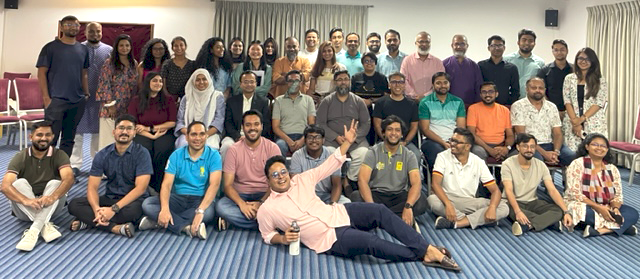
Our second B-Briddhi impact ecosystem excursion gathered 44 participants from 29 impactful enterprises, ecosystem enablers, and investors. And it was truly inspiring. The transformative workshop at BRAC CDM Savar from September 28th to 30th had a dual purpose: (1) to enrich participants’ understanding of adaptive leadership, empowering them to enhance their organization’s ability to create impact, and (2) to cultivate collaboration, peer learning, and a shared understanding of impact. The event also served as a platform to forge collaborations for the future. Our discussions focused on the Theory of Change (ToC) framework, which then serves to articulate a visionary path and steer B-Briddhi’s priorities for phase 2.
Under the expert guidance of Ayeleen Ajanee, founder of Acumen Academy Bangladesh, the sessions on adaptive leadership were especially enlightening. Participants received profound insights that enabled them to grasp the concept’s potential for fortifying their mission focus. We were happy to witness meaningful interactions that encouraged the participants to share their perspectives, experiences, and areas for growth. As a result, they are better equipped to lead their organizations with a heightened mission focus and develop a better strategic alignment between objectives and day-to-day operations. This, in turn, can create a more profound impact on vulnerable populations.
Besides this knowledge sharing, the participants had the opportunity to connect with fellow ecosystem stakeholders and pave the way for partnerships – another important element that will strengthen phase 2 of the B-Briddhi programme and enhance its effectiveness and reach.

Walking the talk: impact ecosystem Theory of Change workshop
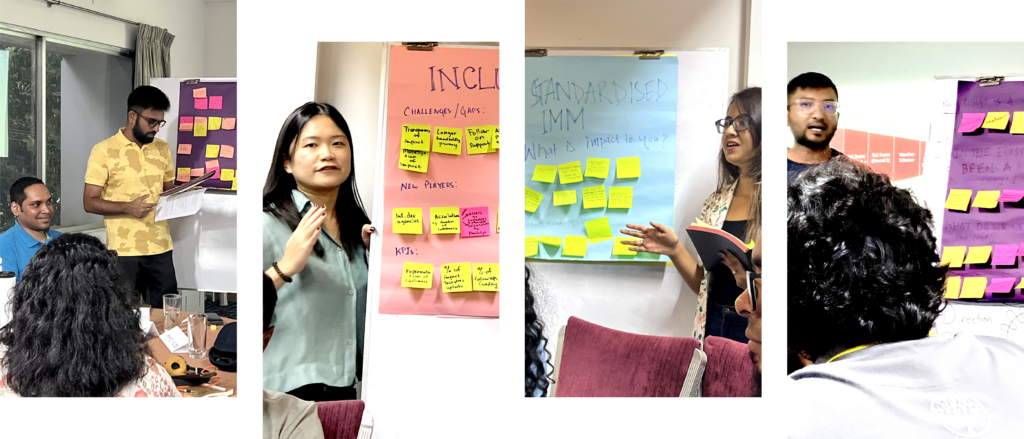
Dr. Fabrice Periac and Dr. Aki Harima kicked off this workshop with a presentation of their research findings around the creation of a sustainable impact ecosystem in Bangladesh. Interactive discussions led to participants identifying critical gaps and potential opportunities. There was a consensus that gender and climate concerns must take centre stage.
In the second part of the workshop, investors, impact enterprise founders, and key ecosystem players split into breakout groups to articulate their vision for the future. The shared objectives revolved around fostering robust partnerships, standardizing Impact Measurement and Management (IMM) practices, enhancing inclusion, and amplifying impact investments. The following are some of the key findings from the lively discussions:
Fostering partnerships: Effective communication, teamwork, and relationship building in partnerships are key. Additionally, the discussion encouraged knowledge sharing and a growth mindset, steering away from individualistic approaches.
Standardized IMM practices: Incorporating established practices such as the Theory of Change, AVPN frameworks, and gender lens investing (GLI) were considered important for the ecosystem’s future. Localized IMM metrics relevant to Bangladesh will be helpful. Participants also called for streamlined and comparable standards for investors and funders.
Greater participation and inclusion: Participants expressed the need for increased engagement, particularly with grassroots enterprises and incubators outside major cities. They also highlighted challenges such as transparency and extended support periods as well as collaboration among founders, talent, investors, and new stakeholders, e.g. international agencies. Additionally, success measurement through KPIs, including customer representation and follow-on funding, was suggested.
Increased impact investments: The group discussed the importance of investees having an impact at their core, understanding their business model, and effectively articulating their investment narrative. Participants also proposed initiatives such as universal financial literacy programs, bridging the digital divide, and sector-specific support in agriculture, health, education, SMEs, agritech, fintech, RMG industry, and the industrial sector.
Homegrown ideas: Collaboration with universities for career support and contributions from non-residents challenging social norms in Bangladesh were recommended. Moreover, participants emphasized mentorship programs, startup support, and innovation fostering for aspiring entrepreneurs. The discussions revealed exciting ideas and opportunities for greater collaboration, and it is safe to say that Bangladesh’s impact ecosystem is on the right track, with multiple pathways to support vulnerable populations.

Exploring the promising Khulna Impact ecosystem

The Roots of Impact and LightCastle Partners teams embarked on an inspiring trip to Khulna, Bangladesh, all geared up for Phase 2 of the B-Briddhi program. Here are some highlights from our mission to this innovative and resilient district.
Khulna is a district brimming with potential but vulnerable to nature’s whims. Our mission was to champion inclusivity, with a spotlight on gender equality and climate adaptation. We were welcomed by the dedicated teams of the Rural Reconstruction Foundation, Community Development Center (CODEC), BRAC Khulna, and Nabolok Parishad. They showcased a holistic approach to community development, empowering local communities, particularly, women and farmers. We were excited to discover the details, learning about the challenges and triumphs shaping their activities in Khulna. And we uncovered golden opportunities for impact enterprises to swoop in with scalable solutions, bolstered by the wisdom of established NGOs in the region.
The educational institutions were another highlight for us. We had the privilege of hearing about the excellent ideas and ventures taking shape at Khulna University of Engineering and Technology (KUET). Six student groups, full of entrepreneurial zest, pitched their startup ideas. We deeply enjoyed the enthusiasm, potential, and vision of the future impact creators of Bangladesh. Our mission team also had a chance to listen to the compelling pitches at a networking dinner with the members of Startup Khulna. 11 organizations working in a range of sectors from logistics to healthcare were present. One example was With She, a health-tech company that aims to create an environmentally and financially sustainable feminine hygiene product and provide education and telehealth visits to underserved women. It was also an opportunity to raise awareness about their program and the importance of impact investing. StartUp Khulna’s vibrant community left us optimistic about the future of impact entrepreneurship in the region and opportunities for collaboration for greater outreach during Phase 2 of B-Briddhi.

Going deep on gender lens investing (GLI)
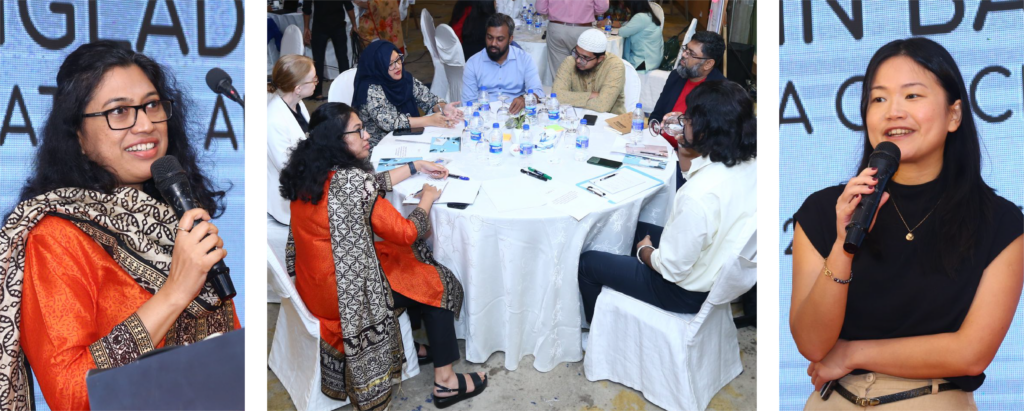
This workshop built on the vibrant discussions from a GLI workshop held earlier this year in March. The mission? To dive deeper into the intricate realms of GLI, unraveling its complexities and uncovering the challenges and opportunities waiting to be tapped into. Participants spent an hour discussing exciting ideas in breakout groups. Their quest? To identify and discuss solutions to the barriers hindering GLI in Bangladesh. It was exciting to witness brainstorming, ideas colliding, and solutions taking shape!
The cherry on top was the insights and solutions woven into the pages of the upcoming Impact Measurement Management Handbook on Gender Lens Investing. B-Briddhi and Truvalu are joining forces to create this guidebook that shall reflect the ecosystem’s needs and respond to them with local, sustainable solutions that support the context. The Gender Lens Investing workshop, therefore, wasn’t just a meeting; it was a celebration of collaboration, a testament to the power of diverse minds uniting for a common objective.


